- Home
- Carolyn Keene
The Secret of the Wooden Lady Page 7
The Secret of the Wooden Lady Read online
Page 7
“Never mind.”
“You’ve sailed on her before?” There was no answer to that, so Nancy continued, “The snuffbox has some connection with the Bonny Scot, hasn’t it? The cameo is like the figurehead that used to be on it.”
Involuntarily the man opened his big hand and glanced at the snuffbox. “Where’d you get that idea?” he grunted.
Nancy felt that she was getting somewhere. If she could take him off guard, perhaps he would say something revealing.
“You stole the box!” she accused him suddenly.
“I did not! It belongs to me!”
“Is that so?” Nancy looked at him skeptically. “You stole it from Captain Easterly’s cabin.”
“You think you know a lot, don’t you? Well, maybe you can tell me how the mate happened to have it, then.”
“The mate?” Nancy repeated eagerly.
Red Quint gave her a startled look, as if just realizing he had said something wrong. With three long strides he was at the top of the nearest sand dune and down the other side.
Nancy ran after him, tripped as her heel caught the top of a hummock, and fell. By the time she struggled to her feet and reached the top of the dune, Quint had vanished.
The little mounds of sand, tufted with stiff grass, stretched for miles along the shore. He probably had dropped flat behind one of them and was waiting for her to go away.
Quint was an unsavory character, Nancy knew. She decided it would be wiser for her to return to the clipper than to hunt for him.
“But I ought to notify the police,” she told herself. “After all, Quint was mixed up with the captain’s kidnapper.”
Nancy retrieved her handbag and then retraced her steps to town and found the local state trooper’s office. He promised to start a search for Quint at once and to alert headquarters.
“I hope he won’t shave off his grizzly beard, so he can’t be identified,” Nancy reflected as she hurried back to the beach.
She shoved the dinghy into the water, and jumped into the boat. As Nancy bent to the oars, she reflected on the strange information Red Quint had given her. Where had he managed to hide on the ship so that even the captain could not find him? What had he meant when he said the mate had the snuffbox? The mate of the Bonny Scot in the old days? She wondered if Red ever had sailed on the clipper.
She was still some distance from the ship when Bess shouted, “Here she comes!”
The girls put down the ladder and helped Nancy aboard, scolding her and asking dozens of questions.
“We thought you’d been drowned, kidnapped, or cut in small pieces!” George told her. “Where were you?”
Nancy told them and Captain Easterly of her visit to Mr. Frisbie and of the struggle with Grizzle Face.
“I’m sure he’s the one who dropped the snuffbox in your cabin, Captain Easterly,” she concluded. “He says he got it from ‘the mate.’ What mate do you suppose he means?”
The captain said he had no idea.
“Quint said there are hiding places on the clipper that even you don’t know about,” Nancy went on.
“That’s possible,” Captain Easterly admitted reluctantly. “Especially if the ship was ever used by pirates. They were a devilish, clever lot. But look here, it’s high time to eat.”
Nancy and the girls followed him down to the galley where they ate the delicious supper Bess had prepared.
Next morning George and Bess said they wanted to go along with Nancy to Mr. Frisbie’s shop. They left Captain Easterly to guard the clipper and enjoy the cool breeze under the deck awning.
The three girls rowed to shore. The first thing Nancy did was call State Police headquarters and ask if Red Quint had been found. There was no word about the man.
When they arrived at the barn, Mr. Frisbie greeted them with a smile. “I see you brought reinforcements,” he said.
“Yes,” said Nancy, and introduced her friends. “We’d like to see your interesting old books and drawings again, if you don’t mind.”
“Go ahead. Glad to find somebody that enjoys them,” he said.
All morning the girls pored over the volumes whose pages were yellow with age.
Later the three friends dined in a little garden tearoom, and afterward walked along a winding road to a cluster of weathered gray cottages. They were occupied by artists who came to paint the sea and the quaint village. The girls watched some of them at work.
Then, at Nancy’s suggestion, Bess and George returned to the ship, donned their swimsuits, and spent a delightful afternoon in the water and on the beach.
While they were swimming, Nancy again searched for a clue in Mr. Frisbie’s old books. She read for some time, but came upon no information on ships with names whose initials could be P. R.
At five o’clock the girls picked her up and rowed back to the Bonny Scot. After supper they came up on deck and dropped into comfortable chairs.
The captain leaned back and lit his pipe as the girls discussed the missing figurehead. “More than one ship has lost its figurehead, for one reason or another,” he said.
“Did they ever change the figurehead on purpose?” George wanted to know.
Captain Easterly puffed on his pipe. “Sometimes they did. For instance, if a ship had a new captain, maybe he wouldn’t like the figurehead. So he’d change it for one he picked out himself.”
Nancy was thinking about another figurehead —the lovely woman carved on the snuffbox she had found.
“I wish I knew more about the mystery of that snuffbox,” she said. “It must be valuable if old Grizzle Face wanted it. I’ll keep on looking till I find the history of it. I have a hunch that figurehead was on this ship.”
“Can you still remember what it looked like?” Bess asked.
“I can now, but I’m afraid I’ll forget later,” Nancy admitted. “I’ll make a sketch of it first thing in the morning.”
“I’m glad you said morning,’ ” George confessed. “I can hardly keep my eyes open.”
The girls said good night to the captain and went below.
Captain Easterly stayed on deck and slept fitfully. Nothing happened, and morning dawned peacefully.
After breakfast Captain Easterly handed Nancy a box of pencils, crayons, and drawing paper he had on board. She set to work sketching the cameo from the snuffbox as best she could from memory. Nancy was so busy that she did not hear an approaching rowboat.
“Ahoy, there!” called a man’s voice.
“Dad!” Nancy jumped to her feet.
He came aboard, smiling. “Looks like an industrious and peaceful crew you’ve got here, Captain Easterly.”
The skipper shook hands with him. “At the moment, Yes. But we’ve had our troubles.”
“What’s this?” Mr. Drew turned to his daughter. “More excitement aboard the Bonny Scot?”
“Mr. Drew, you should have been here during the storm!” Bess exclaimed. “It was simply horrible.”
“It was exciting,” George and Nancy said together, laughing.
The girls told him about the voyage from Boston, the fire, the storm, and the two stowaways, one of whom had jumped overboard.
Mr. Drew frowned. “You’re lucky to be alive.” “The other stowaway was Red Quint. He was aboard all the time,” George reported.
“He was looking for something,” Nancy explained. “But we have no idea what. He dropped a snuffbox with a cameo of a lady on it—like this.” She showed her father the half-finished sketch.
“Handsome woman,” Carson Drew commented. “Why are you sketching her?”
“Because I think she was a figurehead,” Nancy replied. “I have a hunch she was the figurehead on the Bonny Scot!”
The lawyer became more interested. “I see you’ve made some progress on the case.”
“That she has,” said the captain.
“I still have a long way to go before solving the mystery.”
Her father looked at her intently. Then he turned to the skipper of th
e Bonny Scot. “Captain Easterly,” he said, “I’m afraid I have bad news for you.”
CHAPTER XII
A Pirate’s Prize
“DAD,” Nancy said in alarm, “what has happened?”
“Oh, nothing to frighten anyone,” the lawyer replied. “Just a big disappointment. I have absolutely nothing to report about the title to this ship. I studied every record I could get hold of. Visited shipbuilding companies and libraries, even talked to old seamen. There isn’t a single mention of a clipper named the Bonny Scot, and nobody’s ever heard of her.”
“And no clue to any other name?” Nancy asked.
Mr. Drew shook his head. “Of course,” he admitted, “there are no records for many of the old ships. It hurts my pride to render a negative report, Captain, especially now that I must give up the case.”
“What do you mean, Dad?” Nancy asked.
“I’ve been called back to River Heights,” her father said. “A case coming up in court. I must leave here this afternoon. Terribly sorry, Cap. tain.”
Mr. Drew looked at his daughter. There was a challenge in his eye. “But how about you staying? If you use the ingenuity and the perseverance I credit you with, Nancy, I believe you’ll solve the case. What do you say?”
Nancy hugged her father, then laughed. “You know, for a minute I thought you were going to make me go home with you. Of course I’ll stay, if Captain Easterly will let me.”
The skipper grunted. “Don’t you girls dare leave me alone with this mystery!”
He said he had a feeling that by solving the mystery of why the intruders came on the ship, the matter of title would be cleared up too.
“And I think Nancy’s the one who can do it,” the captain said staunchly.
After lunch Nancy told her friends she would row her father over to the village, to take his bus for the airport. “I think while I’m in town, I’ll stop at Mr. Frisbie’s.”
“Again?” George teased. “Count me out this time.”
“If you don’t mind,” said Bess, “I’ll stay here and write a letter home, then go for a swim.” George decided to stay with her cousin.
Nancy wanted her friends to have some vacation fun at Cape Cod, and said that there was no need for them to accompany her.
Before going to the barn, Nancy once more called the State Police. There was no report on Grizzle Face Quint.
Mr. Frisbie did not seem surprised when Nancy walked into the studio. He said, “Good afternoon!” with his usual abruptness, but his frosty blue eyes softened in a smile as he waited for her to climb the steps to the second floor. Instead, Nancy stood still, staring at what had once been a large block of black wood on the workbench. Now it had the rough outline of a small body.
“Is this going to be a figurehead?” Nancy asked.
“Yes, and by the time she’s finished, the young lady will weigh only twenty pounds,” Mr. Frisbie said. “She started out at four hundred.” He grinned.
“You mean you have to throw away all that wood?” Nancy thought this was a dreadful waste.
“Nowadays, figureheads are carved from a solid block, and usually from ebony, like this one,” Mr. Frisbie explained. “Then no heads or legs can drop off like in the old days when the parts were jointed together.”
The sculptor said even hard woods like oak were not as durable as ebony, and in his work he would use nothing but the best. “After all, I’m creating a beautiful young lady,” he said.
Nancy chuckled as she left to go upstairs. Presently she was deep again in the study of Mr. Frisbie’s books on sailing ships.
Suddenly a new thought struck her. Perhaps the initials P. R. stood for a person instead of a ship! If the design carved on the snuffbox were a ship’s figurehead, couldn’t the P. R. refer to the ship’s master?
Eagerly the young detective began looking for the names of captains whose initials were P. R. She would pay special attention to ships whose fates were unknown.
This new lead had some exciting results. She learned from one of the books, which looked as if it had been through many a hurricane, about a vessel named the Dream of Melissa.
The clipper was on her way home to Provincetown from Bombay, under the command of Captain Perry Rogers. When last seen she had been heading for Sunda Strait, between Java and Sumatra.
No one knew what had happened to the Dream of Melissa. She had simply disappeared. So far as was known, no trace of the ship or cargo had ever been found. Neither captain nor crew had ever been heard from again!
Nancy’s eyes were bright with excitement. The Melissa’s captain, Perry Rogers, had the initials P. R. The snuffbox could have been his! The figure on it was a dreamy-faced woman. She might well be the Melissa of the ship’s name!
The Dream of Melissa had carried a costly cargo of rugs, silks, and perfumes.
“Surely a pirate’s prize!” Nancy reflected.
Captain Easterly had told her that the clippers sailing to and from the Far East had often been attacked by pirates. He had even mentioned that the islands off Java were a favorite hideout for these sea gangsters.
Perhaps, Nancy thought excitedly, pirates had seized the Dream of Melissa. If they intended to keep the ship, of course they would have to change her name. And naturally they would get rid of the figurehead—it was too good a clue to the ship’s identity.
Nancy closed the book. “The Bonny Scot,” she told herself, “may really be the Dream of Melissa.”
Her eyes aglow, she ran to the first floor to speak to Mr. Frisbie. All she found was a crisp note:Lock up when you leave.
Smiling, Nancy looked at her watch. Six o’clock! She locked the barn door, hurried to the dinghy, and made fast time out to the clipper. Her eager face told the others she had found something this time.
“Out with it,” George demanded.
After Nancy had told her story, Bess shivered. “My goodness, to think I may have been sleeping in some pirate’s bunk!”
“Those stowaways may know about the pirates and think there’s hidden loot on board!” George added.
“Now just a minute, girls,” Captain Easterly spoke up. “Seems to me you’re jumping to conclusions. In the morning we’ll make plans for tracking down this dream ship of yours, Nancy,” he said. “No more work tonight.”
But Nancy could not get the Dream of Melissa out of her mind. She lay awake, wondering if the Bonny Scot could have borne that other name. If it had been captured by pirates, what had happened to Captain Perry Rogers? Was it to his mate Grizzle Face had referred?
Such exciting thoughts kept Nancy wide awake until after midnight. Captain Easterly, she knew, had been too tired to remain on watch and had gone to his cabin. George and Bess were sleeping peacefully in their bunks. Nancy heard nothing but the soft slap of water on the ship’s side and the creaking of the masts.
Suddenly a new sound made her sit straight up, nerves tingling. Just outside her porthole she heard a soft thump, thump, thump!
Nancy slid out of her bunk and threw on a coat. Slipping a flashlight from under her pillow, she tiptoed into the passageway and knocked on the captain’s door.
“Captain Easterly, there’s someone on boardl” she called softly.
Then, without waiting for him to appear, she ran up to the deck.
CHAPTER XIII
The Shadowy Figure
NANCY stopped at the top of the companionway. She could see nothing clearly. If someone had come aboard he might be crouching close to her on the shadowy deck. She moved forward cautiously.
Heavy mist swirled about the ship, making the masts and rigging seem vague and unreal. Somewhere in the distance a foghorn wailed.
Suddenly Nancy froze, her hands clenched. A figure was coming over the rail, directly in front of her! Nancy slipped quickly into the shadows. Whoever he was, he had not seen her. She had the advantage!
The intruder dropped catlike to the deck, then moved quickly out of sight in the mist. Nancy made her way cautiously after him. If onl
y she could see the stranger’s face!
Would he turn around if she flashed her light on him?
“I’ll try it,” she decided, and snapped on the light.
The man was startled but did not turn around. Bent almost double, with his sleeve raised to conceal the side of his face, he scurried ahead into the shrouding mist.
Nancy ran after him, but he disappeared in the inky shadows. She had not heard a splash. He must still be aboard!
Nancy’s heart beat rapidly. It was one thing for her to follow a fugitive she could see, but quite another to have a stranger jump at her from some dark spot.
Where was Captain Easterly? Nancy thought uneasily as she pondered what to do next. To her relief, the skipper’s voice boomed out behind her.
“Nancy, where are you? What’s up?”
Quickly Nancy retraced her steps and in whispered tones told him what had happened. “I’m sure the man’s still aboard,” she concluded. “Maybe he’s gone below.”
“We’ll look up here first,” the captain ordered. Swinging their flashlights, he and Nancy covered the damp planking, the coiled ropes and hawsers, the rigging, the hatch covers. There was no sign of the man they were hunting. Before going below to continue the search, Captain Easterly said: “Where did he come aboard?”
Nancy led the skipper to the spot where she had seen the intruder come over the side. As they reached it, their flashlights revealed a rope wriggling over the rail. A moment later it dropped to the water. Together they bent over the rail, sweeping the water with their flashlights. A man was sitting in a rowboat!
“Who are you? Stop!” the captain roared.
The fugitive did not answer. He hunched his head into his shoulders, shoved an oar against the Bonny Scot, and the rowboat slid away into the billowing mist.
“Oh, dear,” Nancy sighed. “I didn’t get a good look at him. Did you, Captain?”
“No, but he’s probably a desperate character, Nancy. You were mighty foolish to come up here without me.”
“I know,” Nancy said contritely, “but I was afraid we’d lose him.”
In the dim light Nancy could see the captain’s face break into a broad smile. He took her arm. “Now that I’ve scolded you, I want to thank you for driving him off the ship. Better get below and finish your night’s sleep,” he added.

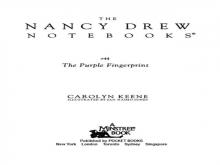 The Purple Fingerprint
The Purple Fingerprint The Picture of Guilt
The Picture of Guilt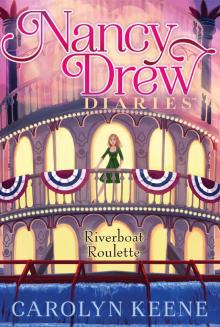 Riverboat Roulette
Riverboat Roulette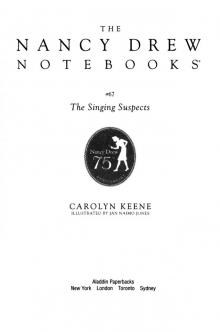 The Singing Suspects
The Singing Suspects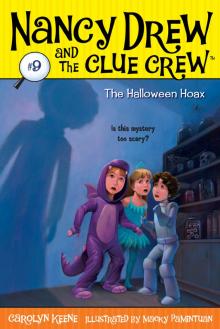 The Halloween Hoax
The Halloween Hoax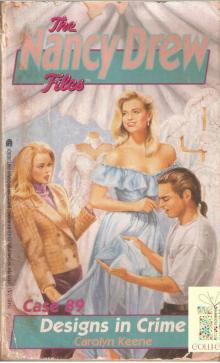 089 Designs in Crime
089 Designs in Crime The Hidden Treasures
The Hidden Treasures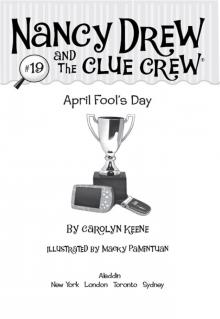 April Fool's Day
April Fool's Day The Black Widow
The Black Widow Final Notes
Final Notes The Haunting on Heliotrope Lane
The Haunting on Heliotrope Lane The Runaway Bride
The Runaway Bride The Ghost of Grey Fox Inn
The Ghost of Grey Fox Inn The Hidden Staircase
The Hidden Staircase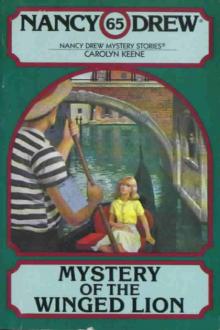 Mystery of the Winged Lion
Mystery of the Winged Lion Over the Edge
Over the Edge The Circus Scare
The Circus Scare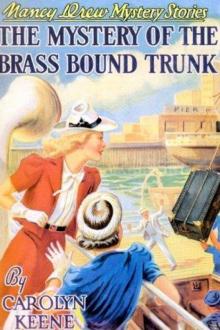 The Mystery of the Brass-Bound Trunk
The Mystery of the Brass-Bound Trunk Ski School Sneak
Ski School Sneak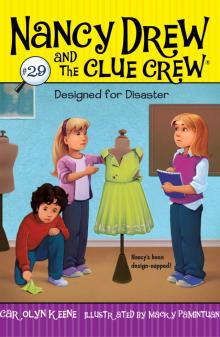 Designed for Disaster
Designed for Disaster The Clue in the Glue
The Clue in the Glue Cold as Ice
Cold as Ice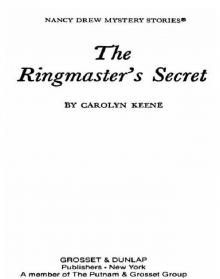 The Ringmaster's Secret
The Ringmaster's Secret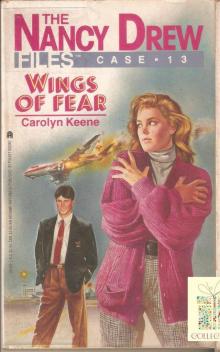 013 Wings of Fear
013 Wings of Fear The Secret of Shadow Ranch
The Secret of Shadow Ranch Not Nice on Ice
Not Nice on Ice Earth Day Escapade
Earth Day Escapade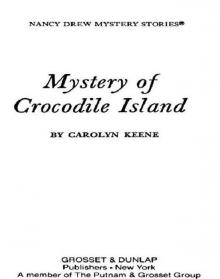 Mystery of Crocodile Island
Mystery of Crocodile Island The Bungalow Mystery
The Bungalow Mystery Power of Suggestion
Power of Suggestion The Lemonade Raid
The Lemonade Raid Model Crime
Model Crime The Lucky Horseshoes
The Lucky Horseshoes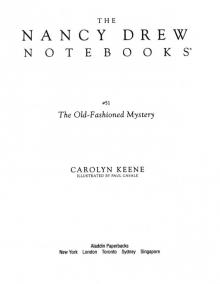 The Secret of the Old Clock
The Secret of the Old Clock The Clue at Black Creek Farm
The Clue at Black Creek Farm Pure Poison
Pure Poison Nobody's Business
Nobody's Business Wrong Track
Wrong Track Chick-Napped!
Chick-Napped!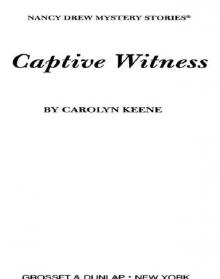 Captive Witness
Captive Witness If Looks Could Kill
If Looks Could Kill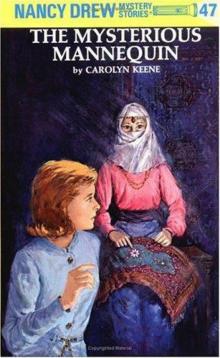 The Mysterious Mannequin
The Mysterious Mannequin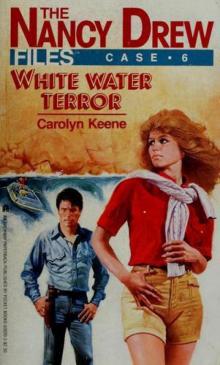 White Water Terror
White Water Terror Mystery of the Midnight Rider
Mystery of the Midnight Rider Space Case
Space Case World Record Mystery
World Record Mystery Hotline to Danger
Hotline to Danger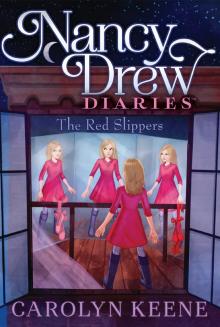 The Red Slippers
The Red Slippers A Crime for Christmas
A Crime for Christmas A Musical Mess
A Musical Mess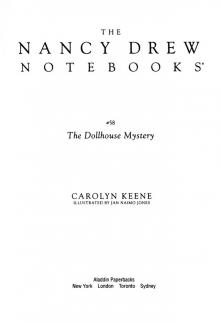 The Dollhouse Mystery
The Dollhouse Mystery Portrait in Crime
Portrait in Crime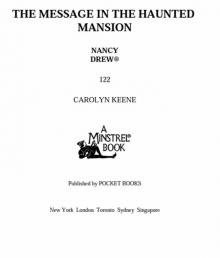 The Message in the Haunted Mansion
The Message in the Haunted Mansion Playing With Fire
Playing With Fire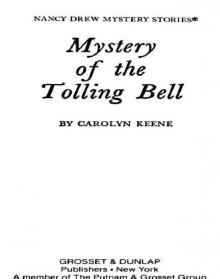 Mystery of the Tolling Bell
Mystery of the Tolling Bell Cutting Edge
Cutting Edge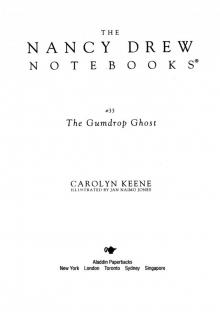 The Gumdrop Ghost
The Gumdrop Ghost The Message in the Hollow Oak
The Message in the Hollow Oak Trial by Fire
Trial by Fire Mystery at Moorsea Manor
Mystery at Moorsea Manor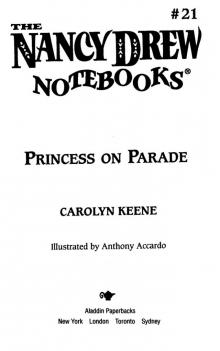 Princess on Parade
Princess on Parade The Flying Saucer Mystery
The Flying Saucer Mystery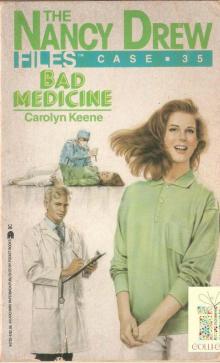 035 Bad Medicine
035 Bad Medicine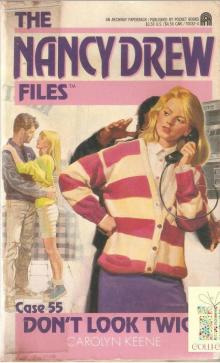 055 Don't Look Twice
055 Don't Look Twice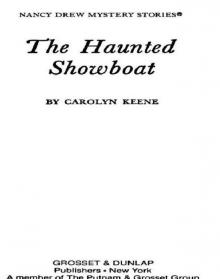 The Haunted Showboat
The Haunted Showboat Out of Bounds
Out of Bounds Choosing Sides
Choosing Sides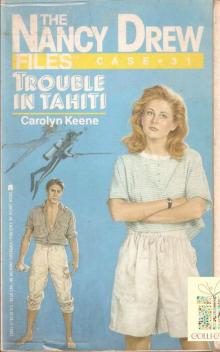 031 Trouble in Tahiti
031 Trouble in Tahiti The Suspect Next Door
The Suspect Next Door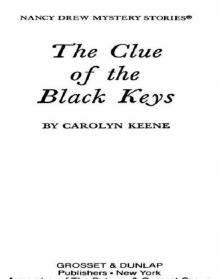 The Clue of the Black Keys
The Clue of the Black Keys The Secret Santa
The Secret Santa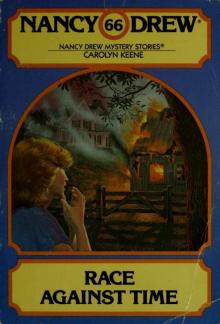 Race Against Time
Race Against Time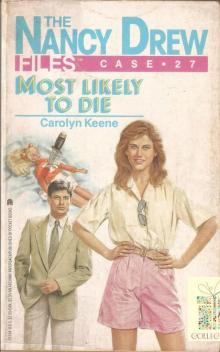 027 Most Likely to Die
027 Most Likely to Die The Cheating Heart
The Cheating Heart Dangerous Relations
Dangerous Relations It's No Joke!
It's No Joke!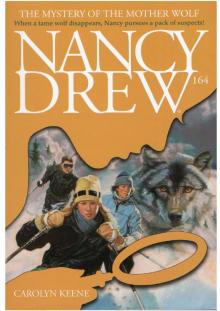 The Mystery of the Mother Wolf
The Mystery of the Mother Wolf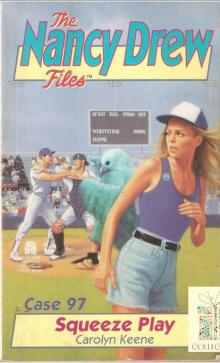 097 Squeeze Play
097 Squeeze Play Secret at Mystic Lake
Secret at Mystic Lake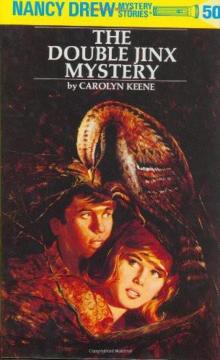 The Double Jinx Mystery
The Double Jinx Mystery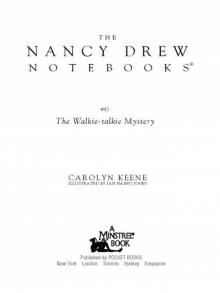 The Walkie Talkie Mystery
The Walkie Talkie Mystery The Case of the Vanishing Veil
The Case of the Vanishing Veil The Mystery of the 99 Steps
The Mystery of the 99 Steps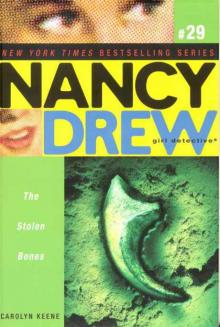 The Stolen Bones
The Stolen Bones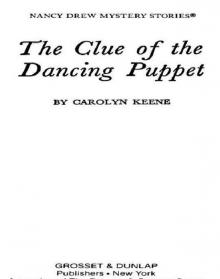 The Clue of the Dancing Puppet
The Clue of the Dancing Puppet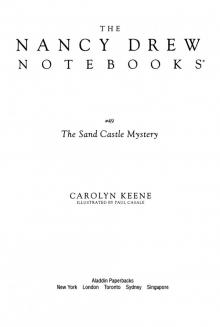 The Sand Castle Mystery
The Sand Castle Mystery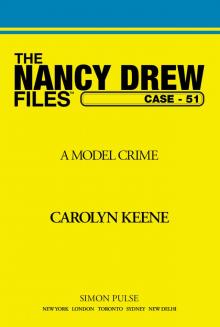 A Model Crime
A Model Crime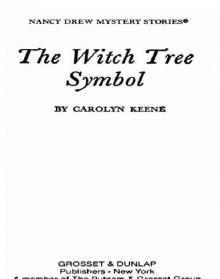 The Witch Tree Symbol
The Witch Tree Symbol The Case of the Artful Crime
The Case of the Artful Crime Mall Madness
Mall Madness Swiss Secrets
Swiss Secrets The Magician's Secret
The Magician's Secret Tall, Dark and Deadly
Tall, Dark and Deadly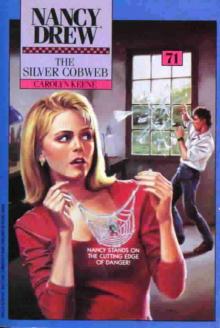 The Silver Cobweb
The Silver Cobweb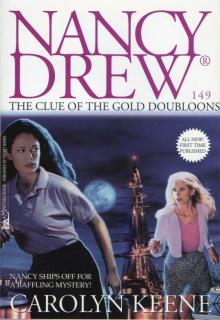 The Clue of the Gold Doubloons
The Clue of the Gold Doubloons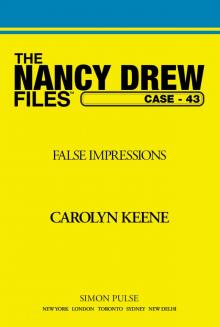 False Impressions
False Impressions Model Suspect
Model Suspect Stay Tuned for Danger
Stay Tuned for Danger Secrets Can Kill
Secrets Can Kill The Bunny-Hop Hoax
The Bunny-Hop Hoax The Cinderella Ballet Mystery
The Cinderella Ballet Mystery The Secret at Solaire
The Secret at Solaire Trash or Treasure?
Trash or Treasure? The Missing Horse Mystery
The Missing Horse Mystery The Lost Locket
The Lost Locket The Secret of the Wooden Lady
The Secret of the Wooden Lady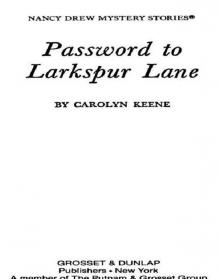 Password to Larkspur Lane
Password to Larkspur Lane Movie Madness
Movie Madness A Secret in Time
A Secret in Time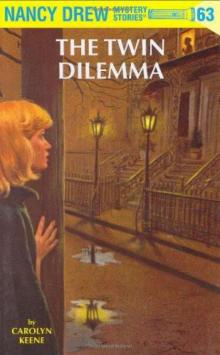 The Twin Dilemma
The Twin Dilemma Candy Is Dandy
Candy Is Dandy Murder on Ice
Murder on Ice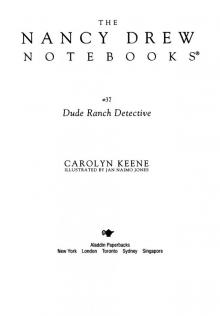 Dude Ranch Detective
Dude Ranch Detective The Slumber Party Secret
The Slumber Party Secret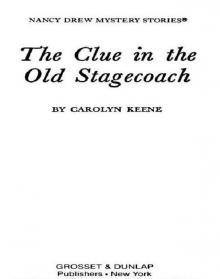 The Clue in the Old Stagecoach
The Clue in the Old Stagecoach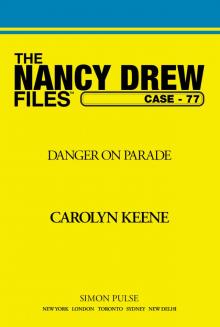 Danger on Parade
Danger on Parade Big Top Flop
Big Top Flop Strangers on a Train
Strangers on a Train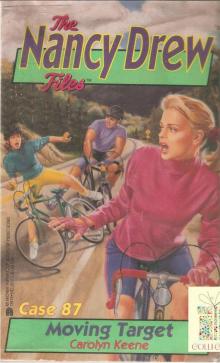 087 Moving Target
087 Moving Target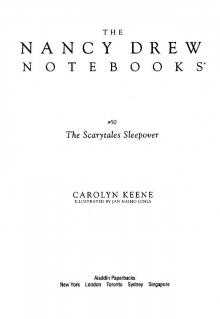 The Scarytales Sleepover
The Scarytales Sleepover The Mystery of the Fire Dragon
The Mystery of the Fire Dragon The Carousel Mystery
The Carousel Mystery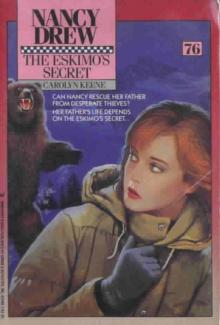 The Eskimo's Secret
The Eskimo's Secret Thrill on the Hill
Thrill on the Hill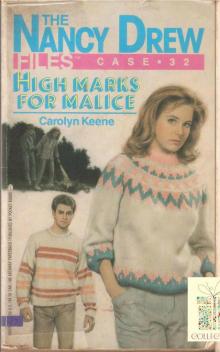 032 High Marks for Malice
032 High Marks for Malice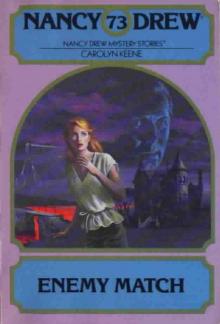 Enemy Match
Enemy Match Poison Pen
Poison Pen Lights, Camera . . . Cats!
Lights, Camera . . . Cats! Lost in the Everglades
Lost in the Everglades Strike-Out Scare
Strike-Out Scare Third-Grade Reporter
Third-Grade Reporter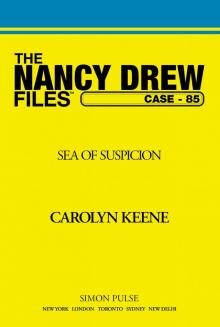 Sea of Suspicion
Sea of Suspicion Wedding Day Disaster
Wedding Day Disaster The Make-A-Pet Mystery
The Make-A-Pet Mystery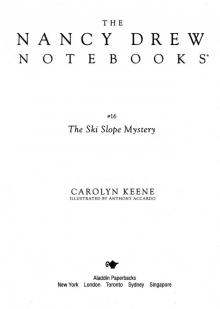 The Ski Slope Mystery
The Ski Slope Mystery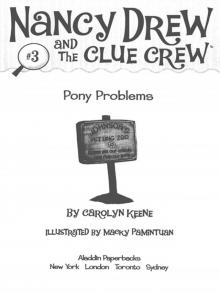 Pony Problems
Pony Problems Candy Kingdom Chaos
Candy Kingdom Chaos The Sign in the Smoke
The Sign in the Smoke The Wrong Chemistry
The Wrong Chemistry Circus Act
Circus Act Sinister Paradise
Sinister Paradise This Side of Evil
This Side of Evil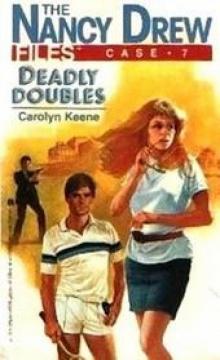 Deadly Doubles
Deadly Doubles The Mystery of the Masked Rider
The Mystery of the Masked Rider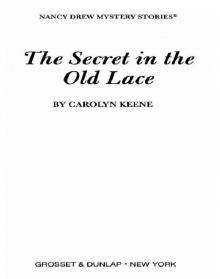 The Secret in the Old Lace
The Secret in the Old Lace The Pen Pal Puzzle
The Pen Pal Puzzle Without a Trace
Without a Trace Whose Pet Is Best?
Whose Pet Is Best? Dance Till You Die
Dance Till You Die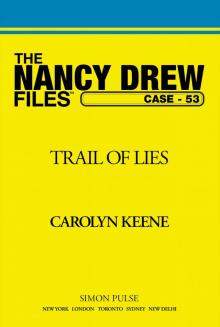 Trail of Lies
Trail of Lies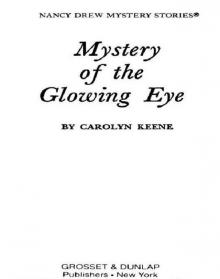 Mystery of the Glowing Eye
Mystery of the Glowing Eye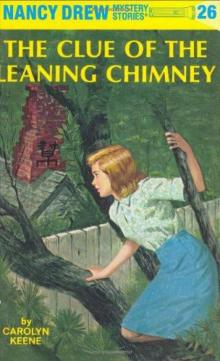 The Clue of the Leaning Chimney
The Clue of the Leaning Chimney The Crook Who Took the Book
The Crook Who Took the Book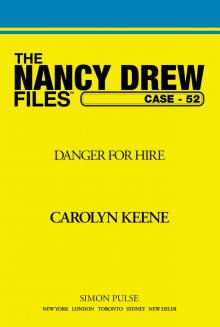 Danger for Hire
Danger for Hire Thanksgiving Thief
Thanksgiving Thief Intruder!
Intruder! The Hidden Window Mystery
The Hidden Window Mystery Win, Place or Die
Win, Place or Die Danger in Disguise
Danger in Disguise The Best Detective
The Best Detective The Thanksgiving Surprise
The Thanksgiving Surprise Stage Fright
Stage Fright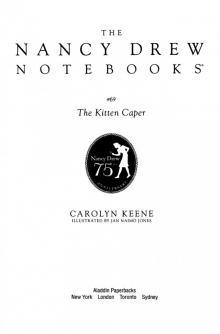 The Kitten Caper
The Kitten Caper Stolen Affections
Stolen Affections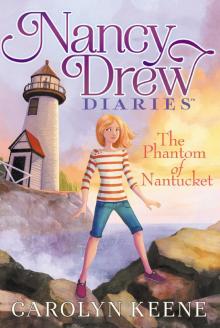 The Phantom of Nantucket
The Phantom of Nantucket Date With Deception
Date With Deception Cooking Camp Disaster
Cooking Camp Disaster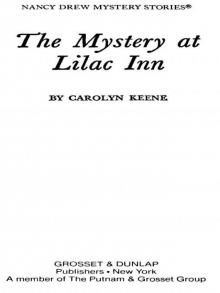 The Mystery at Lilac Inn
The Mystery at Lilac Inn Springtime Crime
Springtime Crime Action!
Action! Into Thin Air
Into Thin Air The Chocolate-Covered Contest
The Chocolate-Covered Contest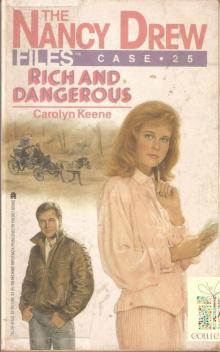 025 Rich and Dangerous
025 Rich and Dangerous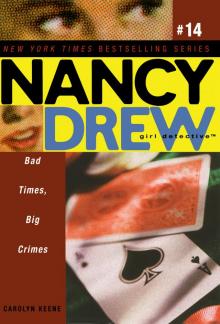 Bad Times, Big Crimes
Bad Times, Big Crimes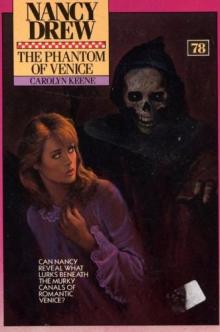 078 The Phantom Of Venice
078 The Phantom Of Venice The Stolen Kiss
The Stolen Kiss Running Scared
Running Scared The Wedding Gift Goof
The Wedding Gift Goof Time Thief
Time Thief The Phantom of Pine Hill
The Phantom of Pine Hill The Secret of the Forgotten City
The Secret of the Forgotten City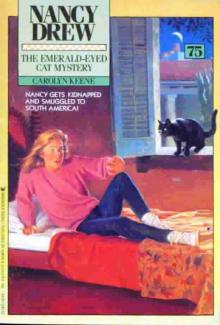 The Emerald-Eyed Cat Mystery
The Emerald-Eyed Cat Mystery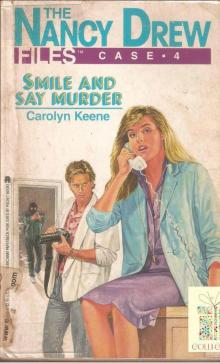 004 Smile and Say Murder
004 Smile and Say Murder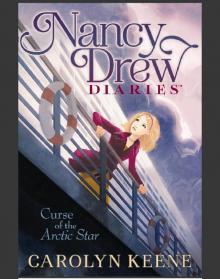 Curse of the Arctic Star
Curse of the Arctic Star Dinosaur Alert!
Dinosaur Alert!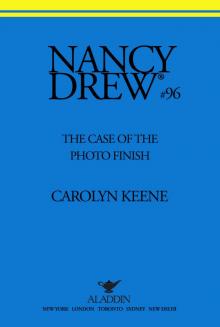 The Case of the Photo Finish
The Case of the Photo Finish Kiss and Tell
Kiss and Tell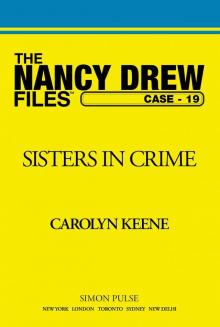 Sisters in Crime
Sisters in Crime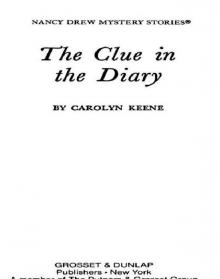 The Clue in the Diary
The Clue in the Diary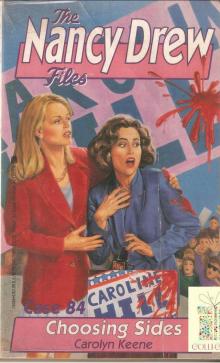 084 Choosing Sides
084 Choosing Sides Haunting of Horse Island
Haunting of Horse Island Vanishing Act
Vanishing Act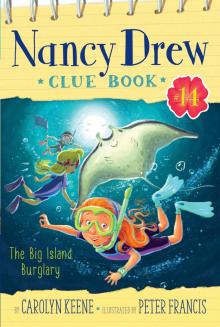 The Big Island Burglary
The Big Island Burglary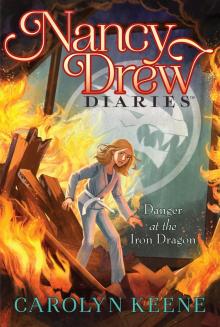 Danger at the Iron Dragon
Danger at the Iron Dragon Pets on Parade
Pets on Parade Something to Hide
Something to Hide The Strange Message in the Parchment
The Strange Message in the Parchment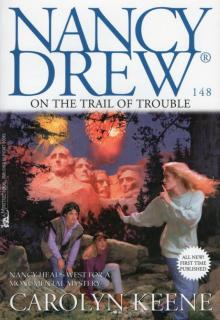 On the Trail of Trouble
On the Trail of Trouble Heart of Danger
Heart of Danger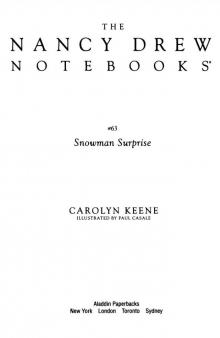 The Snowman Surprise
The Snowman Surprise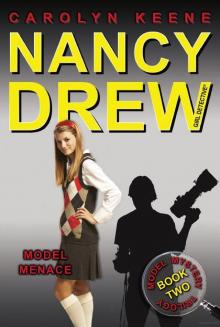 Model Menace
Model Menace Flower Power
Flower Power The Great Goat Gaffe
The Great Goat Gaffe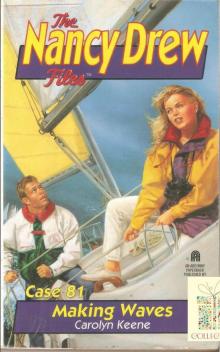 081 Making Waves
081 Making Waves Famous Mistakes
Famous Mistakes The Fashion Disaster
The Fashion Disaster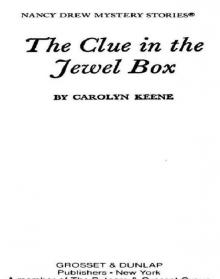 The Clue in the Jewel Box
The Clue in the Jewel Box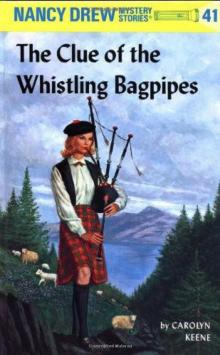 The Clue of the Whistling Bagpipes
The Clue of the Whistling Bagpipes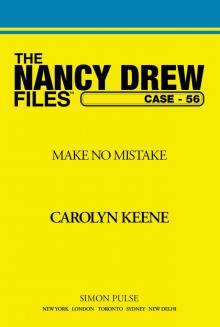 Make No Mistake
Make No Mistake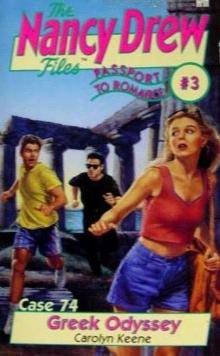 Greek Odyssey
Greek Odyssey Flirting With Danger
Flirting With Danger Double Take
Double Take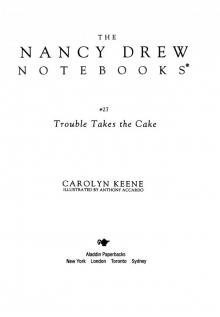 Trouble Takes the Cake
Trouble Takes the Cake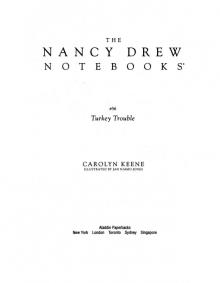 Turkey Trouble
Turkey Trouble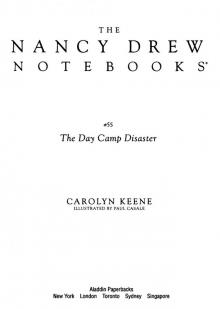 The Day Camp Disaster
The Day Camp Disaster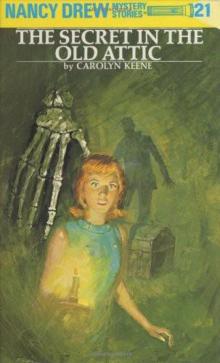 The Secret in the Old Attic
The Secret in the Old Attic The Baby-Sitter Burglaries
The Baby-Sitter Burglaries Recipe for Murder
Recipe for Murder The Secret of the Scarecrow
The Secret of the Scarecrow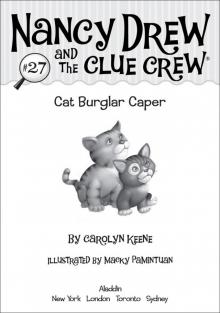 Cat Burglar Caper
Cat Burglar Caper Turkey Trot Plot
Turkey Trot Plot Scent of Danger
Scent of Danger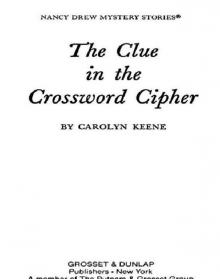 The Clue in the Crossword Cipher
The Clue in the Crossword Cipher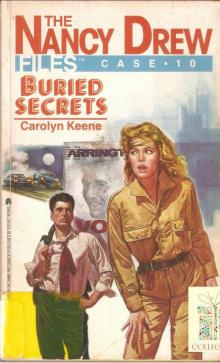 010 Buried Secrets
010 Buried Secrets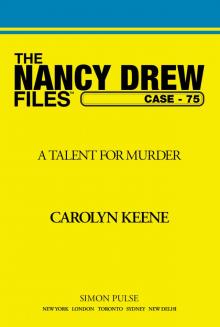 A Talent for Murder
A Talent for Murder The Triple Hoax
The Triple Hoax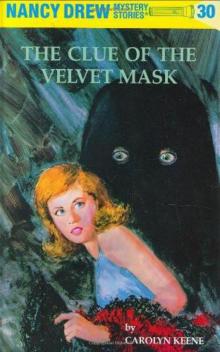 The Clue of the Velvet Mask
The Clue of the Velvet Mask Last Lemonade Standing
Last Lemonade Standing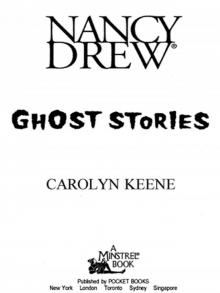 The Ghost of Blackwood Hall
The Ghost of Blackwood Hall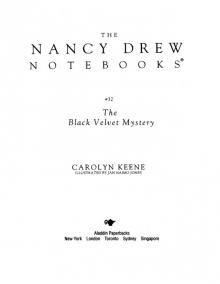 The Black Velvet Mystery
The Black Velvet Mystery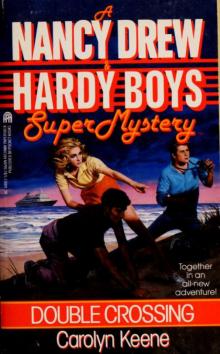 Double Crossing
Double Crossing Hidden Meanings
Hidden Meanings Trouble at Camp Treehouse
Trouble at Camp Treehouse An Instinct for Trouble
An Instinct for Trouble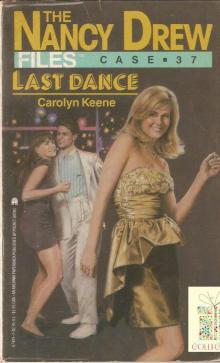 037 Last Dance
037 Last Dance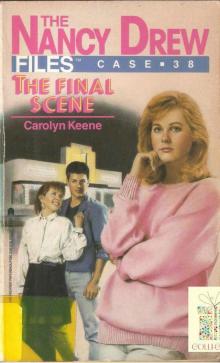 038 The Final Scene
038 The Final Scene Duck Derby Debacle
Duck Derby Debacle The Pumpkin Patch Puzzle
The Pumpkin Patch Puzzle Hidden Pictures
Hidden Pictures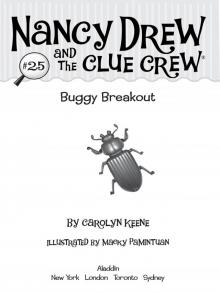 Buggy Breakout
Buggy Breakout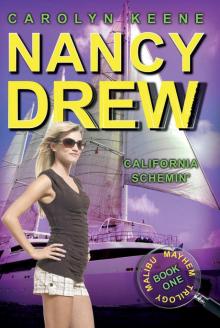 California Schemin'
California Schemin'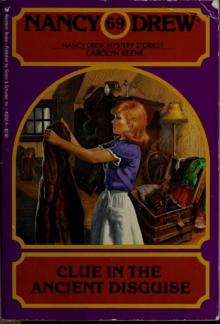 Clue in the Ancient Disguise
Clue in the Ancient Disguise Case of the Sneaky Snowman
Case of the Sneaky Snowman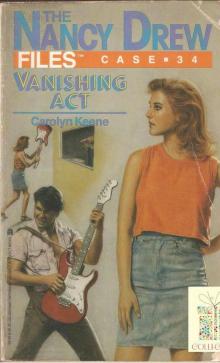 034 Vanishing Act
034 Vanishing Act A Script for Danger
A Script for Danger The Flower Show Fiasco
The Flower Show Fiasco Shadow of a Doubt
Shadow of a Doubt Easy Marks
Easy Marks Alien in the Classroom
Alien in the Classroom Ghost Stories, #2 (Nancy Drew)
Ghost Stories, #2 (Nancy Drew) The Bike Race Mystery
The Bike Race Mystery False Pretenses
False Pretenses The Kachina Doll Mystery
The Kachina Doll Mystery Designs in Crime
Designs in Crime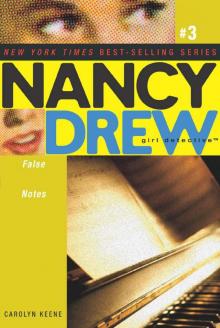 False Notes
False Notes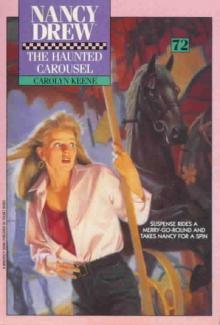 The Haunted Carousel
The Haunted Carousel Bad Day for Ballet
Bad Day for Ballet Very Deadly Yours
Very Deadly Yours The Fine-Feathered Mystery
The Fine-Feathered Mystery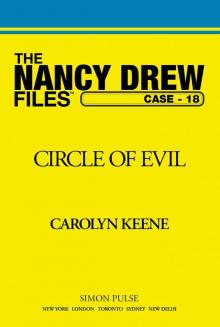 Circle of Evil
Circle of Evil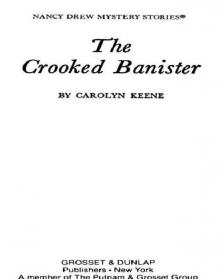 The Crooked Banister
The Crooked Banister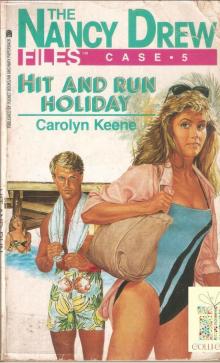 005 Hit and Run Holiday
005 Hit and Run Holiday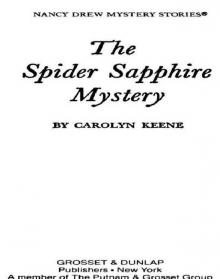 The Spider Sapphire Mystery
The Spider Sapphire Mystery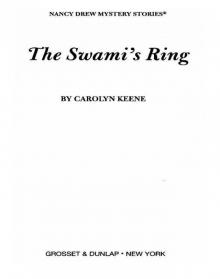 The Swami's Ring
The Swami's Ring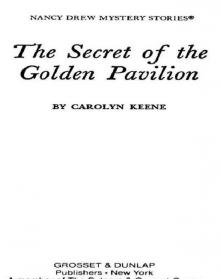 The Secret of the Golden Pavilion
The Secret of the Golden Pavilion Recipe for Trouble
Recipe for Trouble Betrayed by Love
Betrayed by Love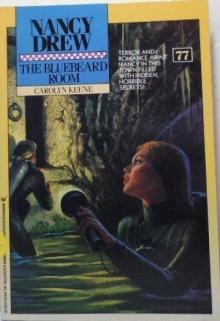 The Bluebeard Room
The Bluebeard Room Sweet Revenge
Sweet Revenge Illusions of Evil
Illusions of Evil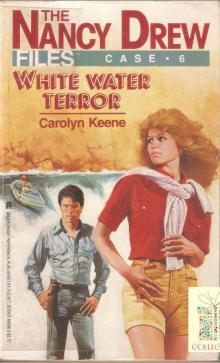 006 White Water Terror
006 White Water Terror High Risk
High Risk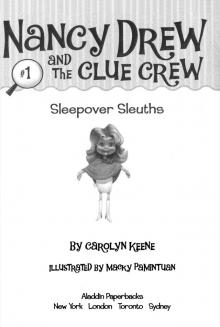 Sleepover Sleuths
Sleepover Sleuths The Clue on the Crystal Dove
The Clue on the Crystal Dove The Stolen Unicorn
The Stolen Unicorn The Professor and the Puzzle
The Professor and the Puzzle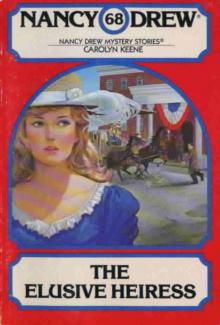 The Elusive Heiress
The Elusive Heiress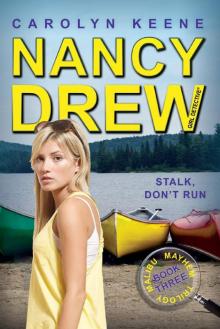 Stalk, Don't Run
Stalk, Don't Run The Mystery at the Moss-Covered Mansion
The Mystery at the Moss-Covered Mansion The Tortoise and the Scare
The Tortoise and the Scare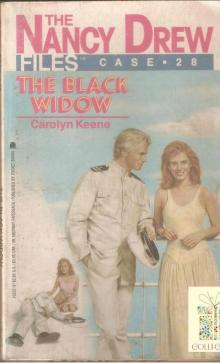 028 The Black Widow
028 The Black Widow Big Worry in Wonderland
Big Worry in Wonderland Crosscurrents
Crosscurrents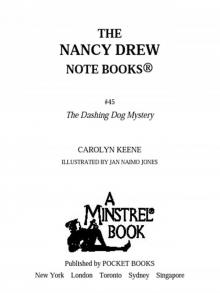 The Dashing Dog Mystery
The Dashing Dog Mystery Fatal Attraction
Fatal Attraction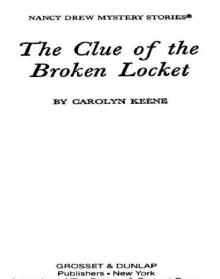 The Clue of the Broken Locket
The Clue of the Broken Locket The Stinky Cheese Surprise
The Stinky Cheese Surprise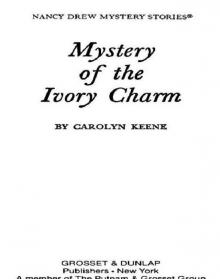 Mystery of the Ivory Charm
Mystery of the Ivory Charm A Race Against Time
A Race Against Time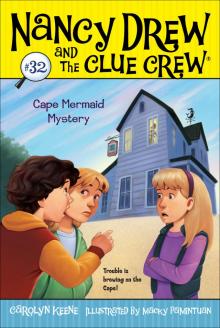 Cape Mermaid Mystery
Cape Mermaid Mystery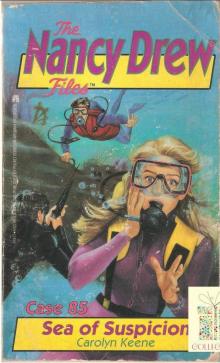 085 Sea of Suspicion
085 Sea of Suspicion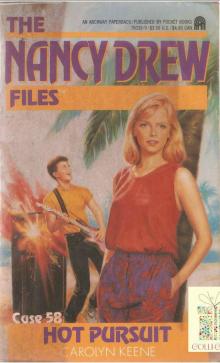 058 Hot Pursuit
058 Hot Pursuit The Secret in the Spooky Woods
The Secret in the Spooky Woods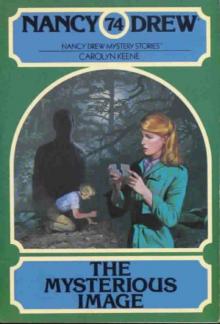 The Mysterious Image
The Mysterious Image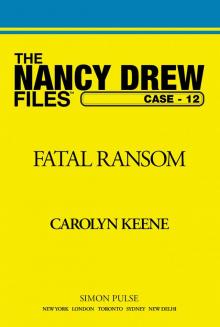 Fatal Ransom
Fatal Ransom The Stolen Show
The Stolen Show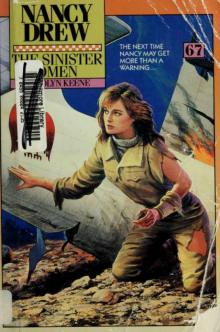 The Sinister Omen
The Sinister Omen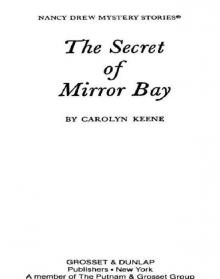 The Secret of Mirror Bay
The Secret of Mirror Bay Rendezvous in Rome
Rendezvous in Rome The Perfect Plot
The Perfect Plot The Mystery of Misty Canyon
The Mystery of Misty Canyon Nancy's Mysterious Letter
Nancy's Mysterious Letter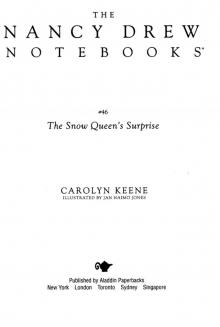 The Snow Queen's Surprise
The Snow Queen's Surprise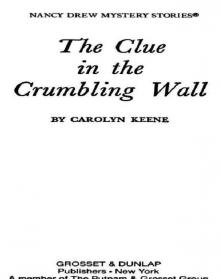 The Clue in the Crumbling Wall
The Clue in the Crumbling Wall Dare at the Fair
Dare at the Fair Scream for Ice Cream
Scream for Ice Cream A Star Witness
A Star Witness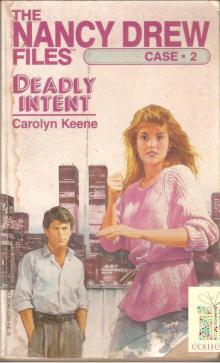 002 Deadly Intent
002 Deadly Intent Museum Mayhem
Museum Mayhem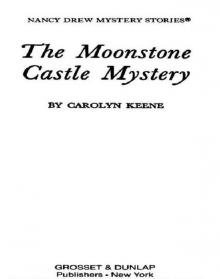 The Moonstone Castle Mystery
The Moonstone Castle Mystery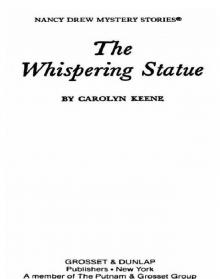 The Whispering Statue
The Whispering Statue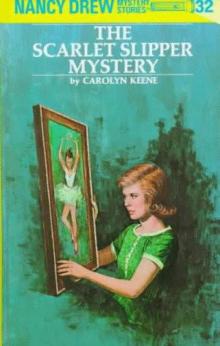 The Scarlet Slipper Mystery
The Scarlet Slipper Mystery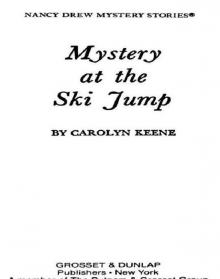 Mystery at the Ski Jump
Mystery at the Ski Jump Hot Pursuit
Hot Pursuit My Deadly Valentine
My Deadly Valentine The Silent Suspect
The Silent Suspect Deep Secrets
Deep Secrets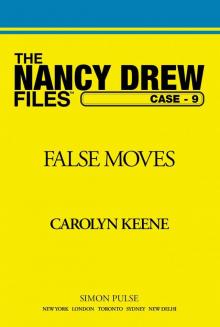 False Moves
False Moves The Zoo Crew
The Zoo Crew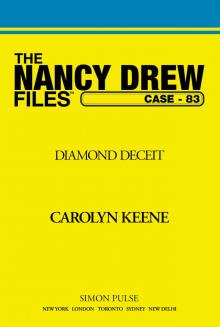 Diamond Deceit
Diamond Deceit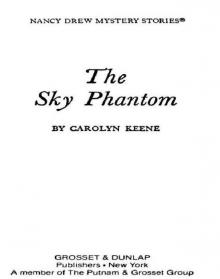 The Sky Phantom
The Sky Phantom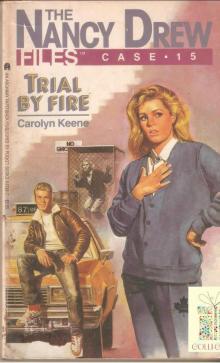 015 Trial by Fire
015 Trial by Fire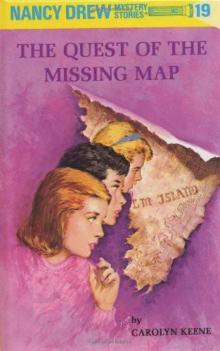 The Quest of the Missing Map
The Quest of the Missing Map Babysitting Bandit
Babysitting Bandit Don't Look Twice
Don't Look Twice Never Say Die
Never Say Die The Soccer Shoe Clue
The Soccer Shoe Clue Pool Party Puzzler
Pool Party Puzzler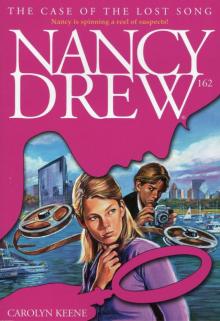 The Case of the Lost Song
The Case of the Lost Song The Apple Bandit
The Apple Bandit No Laughing Matter
No Laughing Matter The Thirteenth Pearl
The Thirteenth Pearl Sabotage at Willow Woods
Sabotage at Willow Woods Butterfly Blues
Butterfly Blues Model Crime 1
Model Crime 1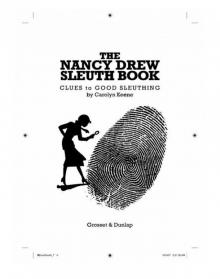 The Nancy Drew Sleuth Book
The Nancy Drew Sleuth Book Mystery by Moonlight
Mystery by Moonlight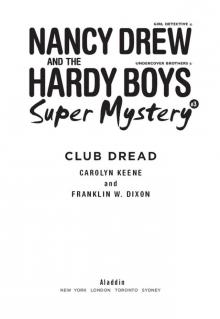 Club Dread
Club Dread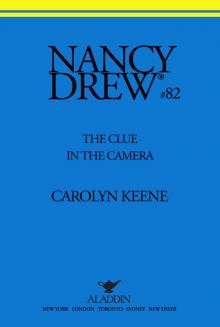 The Clue in the Camera
The Clue in the Camera 118 Betrayed By Love
118 Betrayed By Love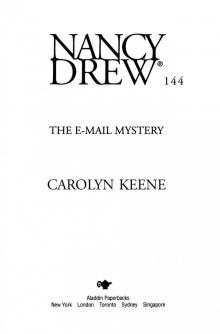 The E-Mail Mystery (Nancy Drew Book 144)
The E-Mail Mystery (Nancy Drew Book 144) Stay Tuned for Danger: Circle of Evil
Stay Tuned for Danger: Circle of Evil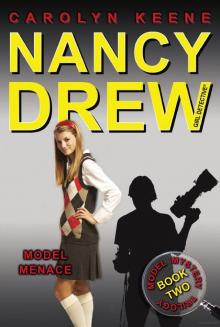 Model Menace 2
Model Menace 2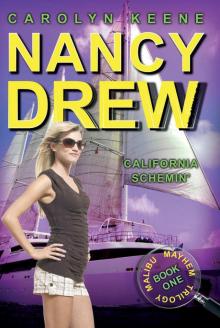 California Schemin': Book One in the Malibu Mayhem Trilogy
California Schemin': Book One in the Malibu Mayhem Trilogy Zoo Clue (Nancy Drew Notebooks)
Zoo Clue (Nancy Drew Notebooks)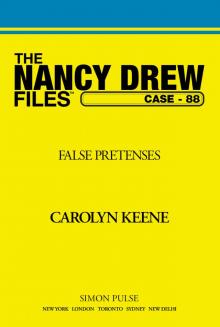 False Pretences
False Pretences 151 The Chocolate-Covered Contest
151 The Chocolate-Covered Contest Close Encounters
Close Encounters The Emeral-Eyed Cat Mystery
The Emeral-Eyed Cat Mystery Boo Crew
Boo Crew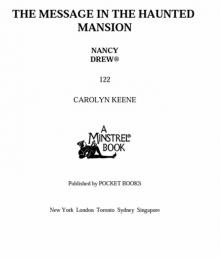 The Message in the Haunted Mansion (Nancy Drew Book 122)
The Message in the Haunted Mansion (Nancy Drew Book 122) A Nancy Drew Christmas
A Nancy Drew Christmas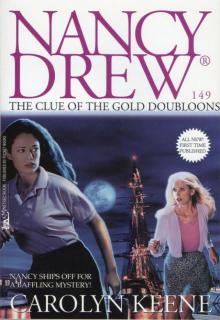 149 The Clue Of The Gold Doubloons
149 The Clue Of The Gold Doubloons A Date with Deception
A Date with Deception 101 The Picture of Guilt
101 The Picture of Guilt The Secret in the Spooky Woods (Nancy Drew Notebooks Book 62)
The Secret in the Spooky Woods (Nancy Drew Notebooks Book 62) The Wrong Track
The Wrong Track Lights! Camera! Clues!
Lights! Camera! Clues! The Vanishing Act
The Vanishing Act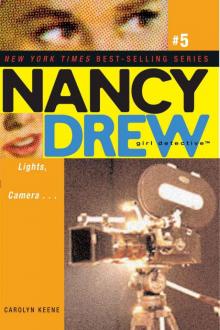 Lights, Camera . . .
Lights, Camera . . . Model Suspect 3
Model Suspect 3 160 The Clue On The Crystal Dove
160 The Clue On The Crystal Dove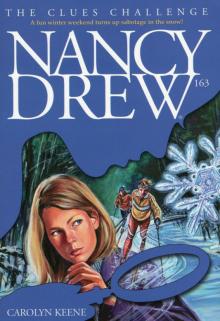 163 The Clues Challenge
163 The Clues Challenge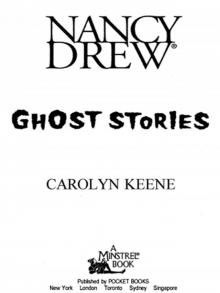 Ghost Stories (Nancy Drew)
Ghost Stories (Nancy Drew) Space Case (Nancy Drew Notebooks Book 61)
Space Case (Nancy Drew Notebooks Book 61)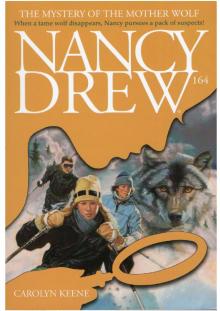 164 The Mystery Of The Mother Wolf
164 The Mystery Of The Mother Wolf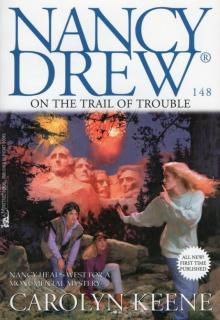 148 On The Trail Of Trouble
148 On The Trail Of Trouble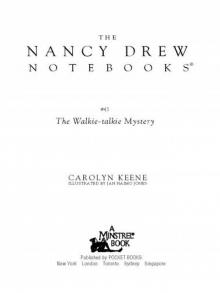 The Walkie-Talkie Mystery
The Walkie-Talkie Mystery The E-Mail Mystery
The E-Mail Mystery Intruder (Nancy Drew (All New) Girl Detective)
Intruder (Nancy Drew (All New) Girl Detective)![The Stolen Relic [Nancy Drew Girl Detective 007] Read online](http://i1.bookreadfree.com/i2/04/11/the_stolen_relic_nancy_drew_girl_detective_007_preview.jpg) The Stolen Relic [Nancy Drew Girl Detective 007]
The Stolen Relic [Nancy Drew Girl Detective 007] 105 Stolen Affections
105 Stolen Affections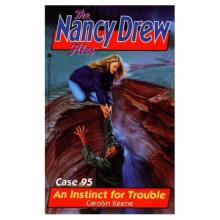 An Instict for Trouble
An Instict for Trouble 161 Lost In The Everglades
161 Lost In The Everglades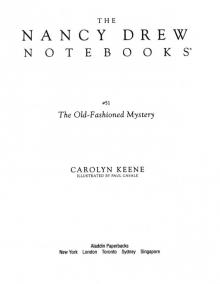 The Old-Fashioned Mystery
The Old-Fashioned Mystery Perfect Plot
Perfect Plot